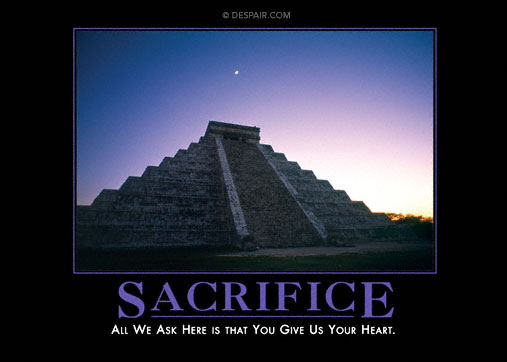Idol Worship
I met a friend for coffee the other day, and we got talking about Catholicism (among other things). One of his chief complaints against Roman Catholics was that they condone idol worship in the form of both worshiping Mary and in how they use statues.
(Note: Official Roman Catholic Doctrine, as confirmed on the Vatican's own site in several articles, teaches the veneration of Mary, not worship. They also teach that all such veneration is ultimately worship of and glory to God. It's complicated. But, I understand why so many people get confused, both Protestants and Catholics, without even getting into things like "the assumption of Mary.")
Official Roman Catholic doctrine, while perhaps vulnerable to idolatry, is not teaching it. Yet, here was a man, my friend, who grew up with this very real problem. Then the words of yet another friend came to mind: Idolatry is at the center of most of the problems in the church. So, if Roman Catholics fall to worshiping Mary, how about my own denomination, or, more broadly, evangelicals?
I thought to myself, who is worse off: Someone who is attempting to center their life on God which, according to the teaching they have received, means kissing the feet of a statue, praying to/with Mary, and believing in the assumption of Mary OR someone who knows all of our familiar terms and doctrines, like salvation by grace alone, talks a good game, so to speak, but who plainly makes all of their life decisions based on the priorities of career, children, and self?
I don't know. But, while that first person may be all too common in some churches around the world, the second person is all to common in evangelical churches right here in Vancouver.
Christopher Wright writes this: "Therein lies the root of all other forms of idolatry: we deify our own capacities, and thereby make gods of ourselves and our choices and all their implications."
If there has ever been a sin that western culture is guilty of, this is it. We are practically committed to this view of the world, that our selves are god, that our choices are ultimate, that we are capable. And even if we doubt these things for a moment, the actions required of us in our culture are such as to constantly reaffirm these beliefs. Not only that, we have to act like we believe these things at all times or risk suffering.
For me, these things become most evident when we try to sell Christianity. Peterson talks about this on page three of the article I told you to read in this post. As soon as we think about Christianity in terms of what it can do for us we are done. "Become Christian and you will be awesome, life will be great, Jesus will fix all your problems!" But all this does is promote more self; placing Christianity in the context of a religion which actually worships an idol. Perhaps this is why morally therapeutic deism is the actual majority religion in the states and, I would say, in Canada. What we really want is not the radical call of Christ to sacrifice our lives for His sake, but someone to come along and make us feel better so we can get on with the rest of our lives which we had planned out and have complete control over.
I understand the allure though. To making self, or children, or career, or family, the center of my life. I mean, in terms of time spent and shared, money spent and shared, and the sheer weight of presence in my life, all of those things outweigh God. Not to mention the temptations of money, image, fame, power, sex, and so much else that is effectively worshiped in our culture.
Let me finish with a quote and an exhortation:
"In contrast to the men and women of the scriptures many Christians sense only weakly the way God intervenes in the world and in each individual life; most Christians find it difficult to develop a daily awareness of God as Sovereign Lord, who holds the initiative in his dealing with us every day. This difficulty of not being aware of the Lord is partly due to our immersion in the media view of the world, where there is absent awareness of God and his ability to work his will in every circumstance in life."
Saturate yourself in a God view of the world, take every thought captive, so that in terms of time spent and shared, money spent and shared, and the sheer weight of presence God can be the one who overwhelms. Bring God with you to work, to your homes, with you families, friends, and children.





Comments
But the problem is idols??? Who cares if people worship idols. I'm going to point out the pedophilia, torture, war, and genocide, that and taking people's money and forcing them to believe in a god who doesn't exist and causing an entire generation to feel guilt over everything and never have good sex.
ok end rant.
A few things to clarify. The friend in question is Filipino, and his experience of Roman Catholicism is coming from that country/context. He was also not speaking in general but personally.
So, while I am not going to say much about your list of problems with the Roman Catholic Church, the point of our conversation was not to bemoan the ills which are evident therein but to share our personal experiences.
So that isn't totally relevant to this issue, but I'm letting you know where I was coming from when i made that comment.
So, how do you go about not letting religions off the hook? I ask because it seems like a very difficult challenge to do more than we already do.
We live in a society that believes far more in placing responsibility on individuals than groups/organizations (often to our detriment, but it is a reality nonetheless).
Other than that, any time you get into anything as complex as a religion it is very difficult to properly assign blame.
To take an extreme example, what about the Nazi's? The events which led to their ascension in German politics and beyond are incredibly complex. They involve nationalism, racism, eugenics, pride, charismatic leaders, religion (both official and badly/expertly manipulated pagan mythology), propaganda, and on and on. So, we are forced to take each one of those on their own and decide, usually pre-decide, if each one of them is bad (like racism) or just being badly used (like nationalism, or at least many have decided; a cleaner example would be the German people themselves) or not that important in the overall scheme of things.
Isn't it the same with religion? How do you separate out the good from the bad and decide which to blame on what?
I have always concluded that people are the problem, and that we are infinitely creative in our ability to use anything for criminal/evil purposes.
I also disagree with your feelings about Christianity (obviously :). If you interested in what I would consider a good book to read about the good in Christianity try "Atheist Delusions" by David Bentley Hart (I know, title may make it sound like I am just trying to convert you; I am not. He is a very good writer, and a good chunk of his book deals with this issue as a positive thrust after his highly negative first sections).